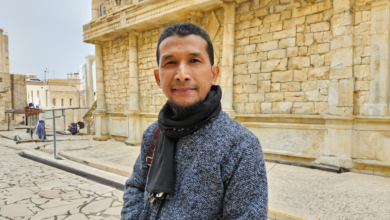
 "Look for the necessities of life by always maintaining self-respect. In fact, all these problems run according to the provisions "(Narrated by Ibn Asakir from Abdullah bin Basri).
"Look for the necessities of life by always maintaining self-respect. In fact, all these problems run according to the provisions "(Narrated by Ibn Asakir from Abdullah bin Basri).
ISLAM strongly emphasizes that his people work, looking for sustenance to meet the needs of life in this world with their own hands, and not become a burden to others. Islam teaches its people to live a balanced life between fulfilling spiritual and physical needs.
And look for what Allah has given you (for the happiness of) the land of the Hereafter, and do not forget your share of (enjoyment) worldly, and do good (to others) as Allah has done good to you. And do not do damage on earth ... (QS. 28: 77).
“Work for your world as if you will live forever. And do good for your afterlife, as if you will die tomorrow ”(HR. Baihaqi). "It is not the best person of you who leaves his world because of the hereafter, nor does he leave the hereafter because of his world. Because, the world is conveyed in the afterlife and do not become a burden on humans ”(Narrated by Ibn 'Asakir from Anas).
Fulfilling spiritual needs is an activity to increase faith and piety, such as exploring Islamic teachings, attending recitations, listening to religious lectures, listening to people's sermons, reading and studying Alquran, support syi'ar Islam or da'wah Islamiyah, and others.
Of course, the main activity of fulfilling spiritual needs is the five daily prayers. Prayer is a symbol of a person's Muslim life. By praying, he had a dialogue with Allah SWT as well as prayed and complained about his life problems. Infusing wealth in the way of Allah, paying zakat mal, donating funds for Islamic da'wah activities, supporting the poor or helping the poor or helping the poor, including fulfilling their spiritual needs as proof of generosity blessed by Allah SWT.
Fulfilling physical needs is looking for sustenance or a living for yourself and your family. In that case, Islam strongly emphasizes that its people work, looking for sustenance to meet the necessities of life in this world with their own hands.
The existence of day and night in this natural world, is a sign of an obligation to work (during the day). And We have made time during the day to strive for a life (QS. An-Naba ': 11). We have made for you all in the earth a field to cultivate life. But very little you are grateful (Surah Al-A'raf: 10). So spread on earth and seek sustenance from the virtue of Allah (QS. Al-Jum'ah: 10). For the sake, if someone among you carries a rope and goes to the hill to find firewood, then is carried to the market to be sold, by working that Allah will provide for your needs, that is better than begging other people .. (Narrated by Bukhari and Muslim).
Working to earn sustenance to provide for the family is even classified as doing charity in the way of Allah (Fi Sabilillah). As the Prophet SAW said, "If someone comes out of the house to work in order to get the life of a young child, then he has tried in the way of Allah. If he works for himself so as not to beg others, that too is in the way of Allah.
But if he works to show off or to boast, then that is "in the way of Satan" or because he is following the path of Satan "(Narrated by Thabrani). Rasulullah SAW was once asked, "What is the best job?" He replied, "The best work is someone's effort with his own hands and all sales are considered good" (HR. Ahmad, Baihaqi, and others).
From a number of texts above, it can be concluded that Islam commands its people to work. That is why, in Islam, work is included in worship because work is a religious obligation. Islam does not want its people to only perform ritual worship (hablum minallah), but wants its people to also pay attention to their own worldly needs (food, clothing, and shelter), not to become unemployed, beggar, or depend on other people to fulfill their daily needs.
At work, Islam also provides direction or guidance - this is the ethics of working in Islam or the "Islamic work ethic". Muslims are required to:
First, do your best. "The best work is the work of a worker if he does his best" (HR. Ahmad).
Second, work hard or be diligent. "Whoever works hard until he is tired from work, then he (his sins) is forgiven for it" (Al-Hadith). "Be careful when looking for sustenance and necessities of life. Indeed, that morning contains blessings and good luck "(Narrated by Ibn Adi from Aisyah).
Third, emphasize the importance of work quality or product quality. "Verily Allah wants if one of you works, then you should improve his quality" (Al-Hadith).
Fourth, maintain self-esteem and work according to existing rules.
"Look for the necessities of life by always maintaining self-respect. In fact, all these problems run according to the provisions "(Narrated by Ibn Asakir from Abdullah bin Basri).
Maintaining self-esteem can mean not breaking the rules, not doing actions that bring shame on oneself, but on the contrary, trying to achieve maximum achievement and prestige. Thieves, robbers, corruptors, extortionists, and the like, of course include "not maintaining self-respect in seeking the necessities of life" and this is strictly prohibited by Islam. What is meant by "all matters run according to the rules" means obeying company rules of conduct or working according to applicable procedures (not to deviate from predetermined rules).
Because working in Islam includes worship, start every job with basmalah, as a sign of asking for approval, and Allah's help in smooth work, and end with hamdalah as a sign of gratitude to Him. Of course, work brings money or wealth. So, use the treasure in the way of Allah, only for things that are pleasing to Him, support yourself and your family, pay zakat, donate it to the poor, and use it for the benefit of religion and Muslims.
In the hereafter, regarding property, Allah will hold us accountable for two things: the origin of the treasure or how to obtain it and use it. May Allah always give us the strength of faith not to violate His rules. Amen! Allah knows bestsystem. (ASM. Romli/ddhongkong.org).*



